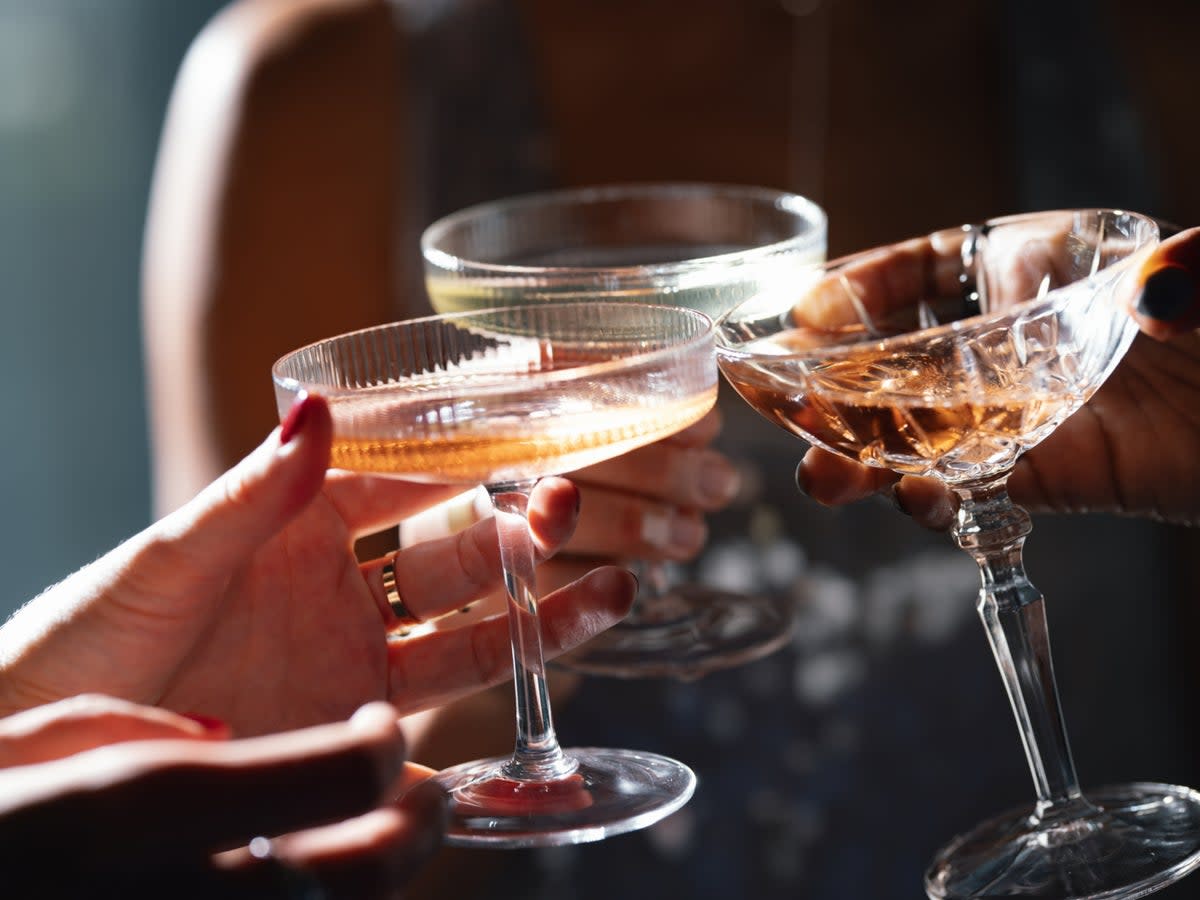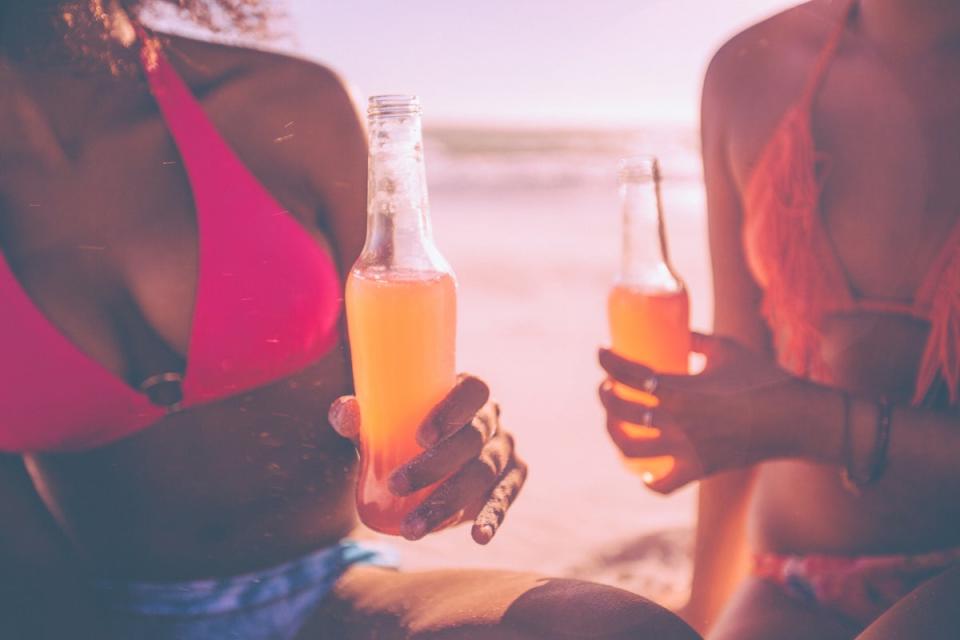Women are binge drinking more than ever – and advertising is making it worse

Vitamins or vodka; dry January or drink this green juice; Christmas indulgence or “Christ! Hit the gym”. This is the reality of being a woman in the 21st century: simultaneously promoted drinking and dieting. Hard seltzers and health kicks.
Research shows a significant link between eating disorders and substance misuse disorder in women, both of which are on the rise alongside drinking-related deaths. While we frequently see news about “sober curious” Gen-Zers, a recent report from the World Health Organisation (WHO) unveiled that young girls in the UK now drink more than boys, and the number of hospital admissions due to alcohol use is now higher for women than for men.
Extreme diet culture and drinking irresponsibly are two scourges cut from the same cloth; they aren’t sustainable, and we’re made to believe we can fill a void and control our happiness with products that will always control us. Love yourself, but not as you are. Drink this, but don’t take it too far. And, while advertisers didn’t create addiction, they’ve disguised problems as solutions, encouraging a feast or famine mentality.
“Advertising reflects society’s values,” says Peter Scott, CEO and founder of ex-advertising empire The Engine Group. Back in its heyday, Scott and his business partner Robin Wight wouldn’t even touch tobacco clients. Now, they claim the game has become increasingly dangerous across the board. Glasses of wine come in regular and large “like you’re at a Starbucks,” says Scott, while already addictive screens are flooded with what Wight calls a culture “under the influence of influencers”.
The practice of targeting women when advertising booze first came into its own in the Eighties, with the birth of the innocent-sounding alcopop. “Liquor distilleries noticed their clientele were dying out so they identified a gap in the market; an entire gender,” Ann Dowsett Johnston, author of Drink: The Intimate Relationship Between Women and Alcohol, tells me. “Thus, the alcopop was born – prepackaged little drinks, vodka-infused, rum-infused, sweet, aimed at young girls.” Bartles and Jayme brought out the first iteration in 1980; producers continue to follow in their footsteps today, with ever-more inventive cocktails in cans for sale, marketed squarely at women.
Dr Katherine Severi, chief executive of the Institute of Alcohol Studies and Dr Alex Barker, lecturer in psychology at the University of Derby, both confirm that alcohol marketing leads to increased “uptake and use” in individuals; and, according to Dr Severi, it contributes to young people starting to drink earlier and at heavy, problematic levels.
While there are restrictions about what you can claim in an alcohol or food advertisement, marketing is such an effective tool because “we’re greatly affected by music and visual imagery,” Wight tells me. “Our decision-making falters, and that’s why adding a song and splash of colour communicates with our subconscious. It’s powerful.”

Adverts clearly work; the current restrictions don’t. Dr Barker explains how easily alcohol brands can loophole their way out of the regulations. Television programmes are a good example; “brands can appear in programmes if they are considered ‘editorially justified’, with no providers being paid for the product. The problem is, it’s very hard to know and/or prove whether money has changed hands, and branded products could be given as props at no cost.”
Take reality TV shows, 98 per cent of which contain alcohol content (with a side of unattainable beauty standards). In one scene of Made and Chelsea, The Den At M Bar mysteriously appeared to sell only 14 bottles of Johnnie Walker. In Season 2 of Keeping up with the Kardashians, Kendall Jenner’s 818 tequila brand was featured “65 times before its launch in the UK”, says Dr Barker. Tune into Love Island, previously sponsored by Echo Falls, and you’ll find hours of high-street fashion flirtation sandwiched between Just Eat and WKD ads.
The rules for live TV are also different to those applied to on-demand streaming programmes. “Alcohol product placement is allowed but must not be aimed at under-18s or encourage ‘immoderate’ drinking,” says Dr Barker. Alcohol sponsorship at sporting events is “self-regulated by the Portman Group, a group composed of alcoholic beverage producers, who seek to ensure that alcohol is promoted in a ‘socially responsible manner’.”
But how is anybody expected to spend, sip or snack on anything “responsibly” when addiction narratives are handled irresponsibly, our mental health is on the decline, and we’re sold supposed self-soothers, shame-inducers and advertised aspirations, leaving many of us feeling “less than”? All you have to do is turn on your TV, scroll through your feed and flick through your nearest magazine to discover the mixed messages women are constantly bombarded with – encouraged to both escape via overindulgence and embrace a never-ending treadmill of self-improvement to achieve the “perfect” face and body.
I was enslaved by a cycle of starvation, binge eating, binge drinking and shopping to feel better
Addiction comes from the Latin word “addicare”. Before “addict” became the slur it is today, it described someone who was enslaved by or bound to something. I know this feeling all too well: I was enslaved by a cycle of starvation, binge eating, binge drinking and shopping to feel better. The worse my relationship with myself became, the more I tried to buy my way out of it. Drinking and hyperfocusing on my body were symptomatic of my poor mental health, not conscious decisions. Initially, they worked; I didn’t have to feel or think about what I was numbing. But down the line, they became the problem. Alcohol didn’t fulfil its advertised promise of connection and relaxation, and diet plans and “guilt-free” snacks only added more unnecessary guilt to my binges. I thought the root of my distress was my appearance, so I spent thousands of pounds I didn’t have, getting into debt and attempting to “rectify” what didn’t need rectifying.
My deterioration was rapid. I went from obese to underweight within a year. The reality of addiction is isolation, and I hid away, eventually reaching a point of suicidal ideation. I needed self-compassion and support, but asking for help is hard when you think you’re the issue.
When discussing the increasing numbers of young girls and women seeking treatment for substance issues and eating disorders, rehab counsellor Daisy King expressed how we’re conditioned to feel ashamed of ourselves, our appetites and our bodies, then “bombarded with advertising that promises to help us change”. The same applies to our drinking habits.
The UK is the only country where Dowsett Johnston’s book, Drink: The Intimate Relationship Between Women and Alcohol, was sold with the word “deadly” in place of “intimate” in the title. Drinking is ingrained in our culture and “sold like a brand of perfume” that we turn to for “reprieve from the insidious messaging that we as women must be perfect. It doesn’t have to be alcohol, it can be food, sex, and, of course, shopping. Anything that changes the way we feel.”

“Marketers feed on this,” says King. “Even though there’s been a shift in acceptance around ‘normal’ weight, when you look at the discrepancy between the ‘ideal weight’ and the ‘actual weight’ of women over the decades, the gap becomes wider and wider.”
Eating disorder recovery dietitian Elle Kelly helped me break free of thinking that attached shame to food and my body. My addictions weren’t a lack of willpower or loss of morals; they were treatable disorders that most people come up against, either in themselves or through a loved one.
Some 3.4 million Brits, 90 per cent of whom are women, have an eating disorder. One in every six adults is at risk of developing one in their lifetime, with binge eating being the most common. Anorexia remains the biggest killer of all psychiatric disorders. Umairah Malik, clinical advice coordinator at the charity Beat, speaks of the importance of challenging the dangerous misconception that only white young women are affected by eating disorders: “That simply isn’t the case, and these misconceptions can lead to delays in getting the right treatment.”
Meanwhile, more children drink in the UK than anywhere else; women’s drinking at all ages is increasing faster than men’s, and the physical effects are following suit. It’s proven that women have heightened risks of liver damage, heart disease, brain damage and breast cancer from drinking. Despite drinking less during the pandemic, women aged 40 to 60 “were significantly more likely than expected to experience serious complications like alcohol-related cardiovascular and liver disease, as well as severe withdrawal,” according to a study conducted by the Journal of JAMA Health Forum. The report also showed that women are considerably less likely to seek or receive treatment due to shame, stigma and the fact we live in a country where women receive poorer healthcare.
There needs to be much less talk about addiction without recovery. There is a solution and addiction isn’t a death sentence
Dr Samantha Duggan
Change is long overdue, and behavioural psychologist and secretary of the All-Party Parliamentary Group on 12 Step Recovery, Dr Samantha Duggan, is one of the women trying to make that happen. “There needs to be much less talk about addiction without recovery. There is a solution and addiction isn’t a death sentence.” Like me, Dr Duggan is multiple years sober; unlike me, early intervention stopped her anorexia from taking hold.
While it’s sad that so many young girls are entering treatment for both alcoholism and eating disorders, King also sees hope ahead. “It means that their problems are being recognised and validated early, and, if caught sooner rather than later, they might save themselves decades of suffering and physical and emotional damage.”
We need to be honest about why so many women are struggling. We need restrictions that rein in irresponsible marketing and advertising. And we desperately need to end the stigma surrounding addiction in all its forms to stop women suffering in silence.

 Yahoo Lifestyle
Yahoo Lifestyle 
